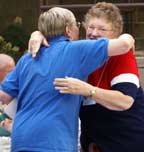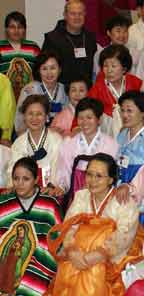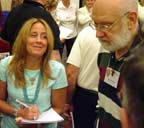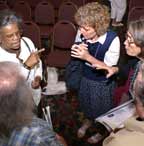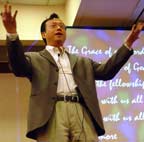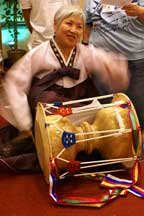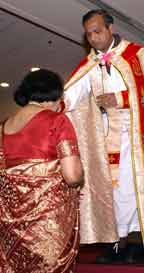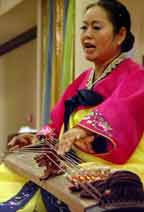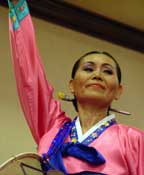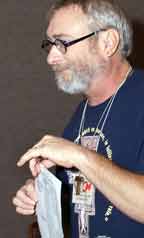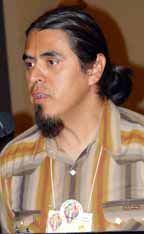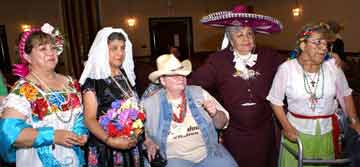|
QUINQUENNIAL CONGRESS XVII, PITTSBURGH, PA * U.S. SECULAR FRANCISCAN ORDER |
Quinquennial Journal: Daily Impressions
|
The author, Vickie Klick, SFO, chairs the NAFRA Computer Committee.
|
By VICKIE KLICK, SFO Tuesday, July 03, 2007 In some ways the “Q” started before I left
The party definitely started by the time we were waiting for the hotel shuttle outside the terminal in Pittsburgh. There were at least two dozen of us waiting, with more arriving! Some of us already knew each other from previous Quinquennials and other national meetings; however, the bottom line was clearly, “If they’re wearing a Tau cross, they’re family – whether we’ve met before or not!” By the time we made it through rush hour traffic to the hotel, I’d made friends with someone new. The family reunion atmosphere kept growing after we arrived at the hotel. What a blessing it is to have so much family! Our opening Mass was celebrated by the bishop of
One of the highlights of any Quinquennial is the “congress fraternities” – small groups assigned at random from the attendees, which meet several times during the course of the week. Tonight, the facilitators of the 40+ congress fraternities met with Fr. Eric Law to discuss the basics of how we will operate our groups. The group process he wants us to use is part of his method for dealing with groups of diverse cultural backgrounds. I think it will be helpful in my dealings with diverse people at work, as well as in fraternal life. I’m curious to see how it will work. Wednesday, July 04, 2007 The first full day of the Quinquennial – and a VERY full day indeed! After breakfast, I went out for a walk – good thing I did, there was little time left over the rest of the day. We started with morning prayer, then announcements and various greetings which ran until time for our keynote speaker to begin. Fr. Eric Law is an Episcopal priest who has worked for many years in promoting effective ways of working within diverse groups of people. He has worked with many Catholic groups, including other Franciscans. His topics for the first day included the basic mechanics for the way our small groups/Congress fraternities are to operate, and some initial material on how to work toward more effective relationships with those who are different from us. Much of what he covered can be found in the newsletters at the website of the Kaleidoscope Institute, which he founded to promote “competent leadership in a diverse changing world”: http://www.ladiocese.org/ki. He will also be providing his slides for me to post on the NAFRA website. One of the key points for today was that “competent leadership” starts with SELF knowledge, and our own makeup is much like an iceberg – part is externally visible, consciously learned, and easily changed to adapt to changing circumstances, but the larger part is unconscious and hard to change. Part of the exercise for our Congress fraternities today was to help us start to be aware of the underside of the iceberg. I spent lunchtime catching up with a friend whom I haven’t had much chance to talk to in the last 2-3 years, then it was off to the exhibit room to be present at the Computer Committee table – happily, just when someone with a problem with the NAFRA database stopped by. We were able to resolve her problem, so that was a good start. We had our first meeting of the Congress fraternities starting at 2 p.m. There were four in my group (I had expected 8-10 – but our group was a nice size anyway). We found the topics that Fr. Law had given us very thought-provoking, and the “mutual invitation” method to manage group interactions worked very well for us. We started out almost total strangers, and learned a good bit about each other and ourselves in a bit under two hours. In addition to an introductory exercise and the “iceberg” self-knowledge exercise already mentioned, we did a lectio divina-style study of Article 13 of the Rule. This led to some challenging realizations for each of us. We moved on to Mass, in Korean and English, celebrated by a Korean friar. It was interesting to have familiar hymns sung with alternate verses in each language! The Koreans present had spent time beforehand practicing so they had a choir to lead us in song. That was the last official activity before a 4th of July dinner of hot dogs, hamburgers, and watermelon. The computer committee spent much of the evening together working (yes, working) before calling it a day. Thursday, July 05, 2007 Handouts from Fr. Law’s presentations are now up on the NAFRA website at http://www.nafra-sfo.org/Quinquennial2007/. Today’s new learning topic came from the field of “cultural anthropology”, and described a spectrum of communication styles based on how much a person needs to know about other people in order to work with them. “Low context” people tend to be more linear in their thinking, focus on fact finding, action and solving problems (among other things). “High context” people tend to take a more spiral approach to logic and focus more on relationships. Not surprisingly, the “techies” in the crowd (like me) tended toward the low context end of the spectrum. As is the case with any dimension of personality such as this, we all operate with aspects of both low and high context. Moreover, there are strengths and weaknesses in both approaches, even though one is usually perceived as “better” – so we need to recognize the benefits that others bring to the table with their different approaches to communication. Our Congress fraternities discussed our “scores” on the context scale and what we saw as our strengths and weaknesses related to that. (I’m finding it very amusing that one person in my group whom I’ve corresponded with by email a few times AND who really wanted to meet me at the Q is turning out to be very much like me in a lot of ways, including communication style, and photography style.) We also studied the Pentecost story from Acts using the mutual invitation technique, which worked quite well. I am looking forward to bringing these concepts and techniques back to the fraternity. Perhaps we can try them for small group discussion at a meeting sometime this fall, and/or at a council meeting. On Saturday we will be discussing how to apply what we’ve learned in our fraternities – I’m looking forward to it! Our Eucharist today was very interesting. It was celebrated in the Syro-Malabar (Indian) rite by a Capuchin friar from southern India (where it sounds like the majority of Indian Christians are located). The Catholic Church in
This evening we had a two hour-plus “Festival of Cultures” – to be continued Friday night. A couple of Native Americans presented prayers and an overview of their people’s cultures. We saw a wonderful classical Indian dance, along with a short presentation on
After all that, the facilitators had a meeting with Fr. Eric to check in on how things were going. Generally, the groups are going very, very well, and the structure is making it a lot easier to bring groups of strangers together than at previous Quinquennials where people basically came together to “just talk”. Friday we have some different presentations – a change of pace. I’ll be looking forward to getting our group back together on Saturday! Friday, July 06, 2007 Another long, good day. In the morning I attended Ed Shirley’s presentation on Secularity. Ed is a professor of religious studies at St. Edmund’s University in
Another thought that I took from Ed’s presentation was that the bread and wine used at Mass represent the entirety of creation before the consecration! They require sun, rain, soil, cultivation, harvesting, grinding, baking, fermenting, transportation…truly “gift of the earth and work of human hands.” Ed took this thought one step further to point out that whatever we do, we all work with “the gift of the earth and human hands,” transforming it into the Kingdom of God. In the afternoon I went to hear Javier Orozco (our regional vice minister) speak on Francis, Divine Providence, and our secular life. The most important points I took from Javier’s talk were questions and challenges for reflection: - What is it about Francis’ life that appeals to me today? - What walls in my life are keeping me away from those who need me most? - Trust in God’s Divine Providence is captured in our Rule largely by Article 11. Javier observed that our call to simplicity, detachment, and poverty includes not only material simplicity/poverty but intellectual and other forms of poverty. Javier suggested three ground rules for understanding our life in the world.
Our Eucharist today was celebrated in the Byzantine rite with the Mass of St. John Chrystostom, by the Metropolitan Archbishop of
My “free time” today was mostly spent working with people who were doing presentations for the second part of the Festival of Cultures tonight. We had another 2+ hours of song, dance, pictures, and information about the
One big difference with this Quinquennial is that we are now expecting to put more and more information on the Internet. I will be getting many of the presentations from the speakers to put on the website. Similarly, I understand that the CDs/DVDs from the week will be available for order through Bob and Mary Stronach’s website. They will also have photos from the Q available for viewing and prints can be ordered. Saturday, July 07, 2007 Well, the Q is over (for me at least) except for breakfast and the trip home. Fr. Eric’s presentation today focused on two points, power analysis and what he calls the “cycle of Gospel living.” Power analysis is the practice of looking at a situation to see who in it is perceived to have more power. Power as defined by society is the ability to manipulate the environment and the ability to influence others. Power analysis can be used as a way of understanding aspects of Scripture, as well as analyzing the situations we encounter in our daily lives. Fr. Eric used the story of Pentecost as an example of how to do power analysis. In the story, there are two groups: Jesus’ disciples and the Jews in Jerusalem. Relatively speaking, the Jews have the power – there are more of them and they are “mainstream,” not a “fringe” group. At Pentecost, the miraculous communication involved the powerless (disciples) being given the ability to speak, and the powerful (Jews) being given the ability to listen and understand. Both are necessary for the miracle of communication to occur. The cycle of Gospel living is alternation of the cross/death and resurrection/life. In the context of power and communication, the cross is giving up power, allowing the other to take control and speak; resurrection is taking up power and speaking. The point in the cycle where you enter it depends on your relative power; if you are powerful, you need to give up power first and embrace the cross, but if you are powerless, you need to accept resurrection and power. Once the cycle is entered, however, both must continue to give up power once they have it, and take it up again in resurrection. If either side holds on to power or persists in powerlessness/passivity/death, nothing happens. If each takes turns letting go of power, then the miracle happens. In an ambiguous situation where it isn’t clear who has more power, mutual invitation is a shortcut to ensuring that all have a chance to speak and share power. For an individual, if you find yourself perceived as powerful, you need to listen; if you find yourself perceived as powerless, you need to speak. When facilitating, find ways to invite the powerless to speak first, and to invite the powerful to listen first. In our small group, we recognized that the tools for communication and self knowledge we learned about and practiced this week will be helpful in many settings, including but by no means limited to our fraternities. Most if not all of the people I’ve talked to are excited about the prospect of sharing these skills with others. Probably the best summary I’ve heard of the message of this week came at lunchtime today, when someone said, “I’ve learned this week that multiculturalism is not a political issue; it is about me and my neighbor.” Our closing Mass was celebrated in Hispanic style, with hymns and readings in Spanish. It was festive and joyous as was appropriate for the final event of this week. Many of us then spent the evening out and about in
Of the three Quinquennials I have been to so far, I think I learned the most at this one. However, I’d still say the best reason for attending any Quinquennial is to be with our brothers and sisters. Even with so many people to renew relationships with, I got to make new friends – even in the van coming from the airport! It is a blessing to be able to take time away and be with so many other Franciscans from around the country and even around the world. |

